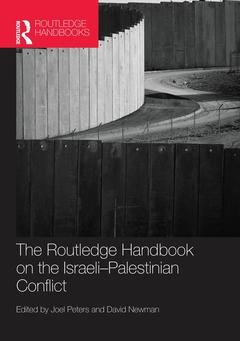Description
Routledge Handbook on the Israeli-Palestinian Conflict
Coordinators: Peters Joel, Newman David
Language: English
Subjects for Routledge Handbook on the Israeli-Palestinian Conflict:
Keywords
Palestinian Authority; gaza; UN; strip; West Bank; east; Al Aqsa Intifada; jerusalem; Secretary Of State; state; Palestinian State; camp; Palestinian Parliament; david; Binyamin Netanyahu; ariel; Gush Emunim; sharon; Civil Society; oslo; Israeli Palestinian Conflict; Oslo Process; Israeli Palestinian Peace Process; Abu Mazen; Yasser Arafat; Camp David Summit; East Jerusalem; Khaled Hroub; Final Status Issues; Occupied Territories; Final Status Agreement; PLO; Muslim World; Israeli Peace Movement; Disengagement Plan
Publication date: 06-2015
· 17.4x24.6 cm · Paperback
Publication date: 11-2012
· 17.4x24.6 cm · Hardback
Description
/li>Contents
/li>Readership
/li>Biography
/li>
The Israeli-Palestinian conflict is one of the most prominent issues in world politics today. Few other issues have dominated the world?s headlines and have attracted such attention from policy makers, the academic community, political analysts, and the world?s media.
The Routledge Handbook on the Israeli- Palestinian Conflict offers a comprehensive and accessible overview of the most contentious and protracted political issue in the Middle East. Bringing together a range of top experts from Israel, Palestine, Europe and North America the Handbook tackles a range of topics including:
- The historical background to the conflict
- peace efforts
- domestic politics
- critical issues such as displacement, Jerusalem and settler movements
- the role of outside players such as the Arab states, the US and the EU
This Handbook provides the reader with an understanding of the complexity of the issues that need to be addressed in order to resolve the conflict, and a detailed examination of the varied interests of the actors involved. In-depth analysis of the conflict is supplemented by a chronology of the conflict, key documents and a range of maps.
The contributors are all leading authorities in their field and have published extensively on the Israeli-Palestinian conflict/peace process. Many have played a leading role in various Track II initiatives accompanying the peace process.
Part 1: Competing Nationalisms 1. The Origins of Zionism Colin Schindler 2. The Palestinian National Movement: from self-rule to statehood Ahmad Samih Khalidi Part 2:Narratives and Key Moments 3. Competing Israeli and Palestinan Narratives Paul Scham 4. The 1948 War: The Battle over History Kirsten E. Schulze 5. The First and Second Palestinian Intifadas Rami Nasrallah 6. The Camp David Summit: a Tale of Two Narratives Joel PetersPart 3: Seeking Peace 7.The Israeli-Palestinian Peace Process: 1967-1993Laura Zittrain Eisenberg 8. Peace Plans: 1993-2012 Galia Golan Part 4: Issues 9.Palestinian Refugees Rex Brynen 10. Jerusalem Michael Dumper 11. Territory and Borders David Newman 12. Water Julie Trottier 13. Terrorism Magnus Norell 14. Religion Yehezkel Landau 15. Economics Arie Arnon 16. Unilaterlaism and Separation Gerald M. Steinberg 17. Gaza Joel Peters Part 5: Domestic Actors 18.The Palestine Liberation Organization Nigel Parsons 19. The Palestinian Authority Nigel Parsons 20. Hamas Khaled Hroub 21. Palestinian Civil Society Michael Schulz 22. Gush Emunim and the Israeli Settler Movement David Newman 23. The Israeli Peace Movements Naomi Chazan Part 6: International Engagement 24. Palestinian Citizens of Israel Amal Jamal 25. The United States: 1948- 1993 Steven L. Spiegel 26. The United States: 1993-2010 Steven L. Spiegel 27. Russia Robert O. Freedman 28. Europe Rosemary Hollis 29. The Arab World P. R. Kumaraswamy 30. The Jewish Diaspora and the Pro-Israel Lobby Dov Waxman Chronology Steve Lutes
Joel Peters is Professor of Government and International Affairs in the School of Public and International Affairs at Virginia Tech. His research interests cover Israeli security and foreign policy and the Israeli-Palestinian process. He is the co-author (with Sharon Pardo) of Uneasy Neighbors: Israel and the European Union.
David Newman is Dean of the Faculty of Humanities and Social Sciences at Ben Gurion University in Israel. Originally a geographer, Newman founded the Department of Politics and Government at that University. He is chief editor of the peer reviewed journal, Geopolitics. His work focuses on territorial dimensions of ethnic conflict with a particular focus on the contemporary significance and functions of borders.




